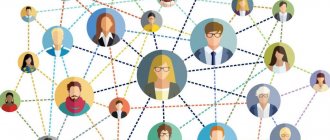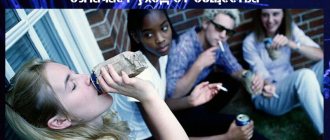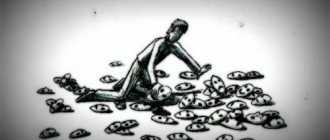Definition 1
In modern scientific psychological literature, the phenomenon of antisocial behavior is understood as a huge spectrum, a set of behavioral strategies that violate social norms, contradict the rules of human society, socially accepted and approved stereotypes of behavior.
Antisocial behavior is behavior that violates both criminal, administrative, and other norms enshrined at the legislative level, and norms fixed in the structure of traditions and customs.
An antisocial person, what does this mean?
An antisocial personality is a person whose actions do not fit into the standards of behavior of modern society. He may violate legal, moral and ethical standards intentionally or out of ignorance, not understanding why his behavior is unacceptable. Another name for an antisocial personality is a sociopath.
Antisocial people are indifferent to established rules and public morality; they do not feel shame or sympathy for others. A complete lack of interest in other people and perverted concepts of moral values prevent them from fully integrating into society.
Important! Without treatment and help, deviant behavior becomes a way of life, leading to criminal acts, infection with HIV and STDs, and death.
Who is a sociopath?
People with antisocial personality disorders are willing to use deception or manipulation to get what they want, such as power or money. They may deceive people and use an alias, as well as steal or use aggressive behavior to achieve their desires. Even if they are caught, they will show no regret or guilt. They lack a sense of empathy and cannot consider other people's feelings without help. They also tend to act impulsively, which can lead to arrests and time in jail.
There is a common myth in popular culture that “sociopaths” are successful, charismatic people who occupy positions of power. It is true that high-functioning sociopaths exist, but they are not the norm.
While the sociopathic path may involve persuasion or charm, most people with the disorder will experience irresponsibility. They are less likely to take advantage of job opportunities, less likely to pay bills on time, and are at high risk of incarceration due to impulsive behavior. They are also likely to have a shorter life expectancy due to impulsive behavior such as substance abuse and criminal activity.
Reasons for asociality
The deviant personality type is formed as a result of the following groups of factors:
- medical;
- pedagogical;
- social.
Also, the cause of deviations may lie in psychological pathologies. They arise when several groups of factors are combined and are difficult to treat.
Medical reasons
Schizophrenia is one of the causes of asociality
Medical factors that provoke asociality include:
- lesions of the fetus inside the womb;
- infections and brain injuries;
- psychosomatic abnormalities;
- schizotypal disorder,
- schizophrenic conditions;
- infantilism, ADHD, heboidity.
Pedagogical reasons
Among the causes of deviance manifested due to improper upbringing are:
- negative example of parents and other family members;
- excessively high demands on the child;
- overprotection or lack of guardianship as such;
- ignoring the child's needs;
- indulgence of all whims;
- frequent and unfair punishments;
- lack of trusting relationships in the family.
Excessive care for a person leads to an antisocial lifestyle
Social reasons
The social factors of deviant behavior include the following:
- problems communicating with peers in children and adolescents;
- the desire to assert oneself at the expense of others;
- material and social inequality;
- living in a dysfunctional family;
- influence of religious sects, subcultures;
- bullying, bullying, ridicule;
- physical and sexual violence.
Social reasons also include addictions that provoke deviance.
Causes of antisocial violations
What causes antisocial personality disorder? Researchers believe genetics plays a role, since having a parent with the disorder puts another person at risk. Research on adopted children of parents with disorders suggests that the environment may also be a factor, for example when children are poorly disciplined, have negative role models, or do not learn to respect the rights of others. Children of parents with alcoholism are also at increased risk.
We suggest you read: Symptoms and signs of panic disorder
Children with conduct disorder or attention-deficit/hyperactivity disorder before age 10 are at increased risk of developing antisocial personality disorder in adulthood. This is especially true for children with conduct disorders who are abused or neglected.
Researchers estimate that 25% of girls and 40% of boys with conduct disorder will have antisocial personality disorder as adults.
Antisocial personality disorder occurs in approximately 3% of the population. This disease occurs 6 times more often in men than in women. 80% of people with the disorder will have symptoms by age 11.
Signs of antisocial behavior
General characteristics characteristic of a deviant personality type include:
- problems in interacting with people;
- conflicts or lack of contact with the environment;
- frequent change of hobbies and circle of friends;
- lack of interest in work, study;
- absent-mindedness, problems concentrating;
- low level of responsibility;
- sleep disorders: insomnia, daytime sleepiness;
- increased or decreased appetite;
- frequent changes in mood;
- indifference and cruelty towards others;
- low or high self-esteem.
Frequent mood swings are one of the signs of sociopathy
Also, symptoms of asociality may include a low or very high degree of intelligence of the patient. A deviant person may have extraordinary abilities or, on the contrary, may not perform well in all disciplines.
There are 4 main forms of manifestation of antisocial behavior:
- addictive;
- immoral;
- illegal;
- criminal.
Each of them has its own set of signs and symptoms.
Addictive type
An addictive form of asociality is a type of behavior characterized by escape from life’s problems. It is characterized by a person’s focus “inward”, avoiding the outside world with the help of various addictions.
Addictive behavior can be expressed:
- alcoholism;
- drug addiction;
- anorexia;
- bulimia;
- nymphomania;
- workaholism;
- religious fanaticism;
- computer and gaming addiction.
Alcoholism as one of the ways to escape from problems is of the addictive type
Attempts to commit suicide can also be a manifestation of addiction.
Most often, addictive antisocial behavior occurs in adolescents and people under 25 years of age. Women are 2-3 times more susceptible to it than men.
Immoral type
An immoral form of asociality is a type of behavior that is unacceptable to society from a moral point of view. He violates the ethical rules of behavior in society and does not pose a direct threat to public order.
Characteristic elements of an immoral asocial personality type:
- promiscuous connections;
- prostitution;
- vagrancy;
- begging;
- reluctance to study and work;
- aggressive behavior;
- drug addiction, alcoholism;
- blasphemy with intent to incite hatred;
- insulting other people, including loved ones.
A riotous lifestyle refers to an immoral type of antisocial behavior
Important! Previously, homosexual relationships were considered an immoral subtype of asociality. This is an erroneous judgment: orientation is determined genetically and does not depend on personality type.
Illegal type
Illegal behavior includes the systematic commission of antisocial acts that violate the legal norms of modern society.
Unlawful antisocial acts include:
- hooliganism;
- fights and beatings;
- arson and vandalism;
- personal insults;
- theft without the intent of theft;
- petty theft and robbery.
Committing such actions is not punishable criminally due to the absence of a serious public danger. Persons caught engaging in unlawful antisocial behavior come to the attention of law enforcement agencies and are often registered.
Fighting is considered antisocial behavior
Criminal type
Criminal or delinquent type of antisocial behavior is the constant or one-time commission of actions punishable by criminal liability.
Criminal behavior includes:
- burglary;
- robbery and banditry;
- robbery;
- fraud;
- extortion;
- organizing riots;
- rape, including unsuccessful rape;
- murder, complicity in murder.
Antisocial people who commit such acts are punished to the fullest extent of the law and may be subject to forced treatment in psychiatric institutions.
Rape may result in forced treatment in psychiatric hospitals
Characteristics of an antisocial personality
Asociality can manifest itself already in elementary school or adolescence. Child:
- Lies to parents and peers.
- Refuses to attend school and shows no interest in studying.
- He has no friends among his peers and refuses to communicate with them. More aggressive children maintain contacts with “bad” companies, communication in which comes down to committing joint offenses - hooliganism, violence, robbery.
- Able to leave home for several days, has a tendency to wander. After returning, the child promises his parents not to do this again, but never keeps his promise.
- Shows aggression towards animals or people who are physically weaker than him.
In adult life such a person:
- Distinguished by dishonesty in relation to work. Antisocial people are characterized by unreasonable absenteeism, negligent attitude towards their duties, and lack of motivation. Often such people refuse to get a job when they have the opportunity to do so.
- Doesn't know how to express his emotions. Both grief and joy can be expressed by antisocial people with hysterics.
- Unable to plan his life, which is manifested by frequent moves, changes of jobs and partners.
- Prone to crime and aggression. Unable or afraid to commit a crime, an antisocial person directs aggression towards close people from whom he does not expect a response - elderly parents, young children, spouses.
- Seeks to satisfy his own needs, regardless of the needs of other people. Being egoists, antisocials are confident in the correctness of their behavior. They have no shame.
- He ignores his material obligations, refusing to pay debts, alimony, or financially help close relatives in need.
Diagnostics
Diagnosis of deviant behavior is carried out by a psychiatrist and a clinical psychologist. The following diagnostic methods are used:
- Inspection and conversation. The specialist assesses the patient’s general condition, his emotional state, manner of speech and behavioral traits. Questions are asked about family, study or work, a person’s hobbies and habits.
- Studying patient data. The doctor studies the characteristics from the place of study or work, extracts from the outpatient card from the neurologist, talks with teachers, employers and police officers, if the patient is registered.
- Questioning family and friends. A psychologist or psychiatrist contacts the patient’s immediate environment, asks questions about his psycho-emotional state, character traits and living conditions.
- Psychological testing. To determine the patient's personality characteristics, tests and questionnaires are used: MMOL, PDO, anxiety scale, Eysenck questionnaire.
- Projective methods. Szondi and Rosenzweig tests, visual studies reveal the patient's hidden and suppressed emotions.
After diagnosing and establishing deviant behavior, the patient begins to be treated with psychotherapeutic, psychocorrective and medicinal methods.
Treatment of antisocial personality disorders
Treating antisocial personality disorders can be challenging. Because symptoms of the disorder begin between the ages of 10 and peak in the 20s, people may find that the symptoms themselves improve as a person reaches 40 years of age and older.
We invite you to read: Dependent personality disorder and borderline personality disorder: comorbidity and treatment
Psychotherapy, or talk therapy, is usually the therapy recommended for antisocial personality disorders. A therapist can help a person cope with negative behavior and develop interpersonal skills that they may be lacking. Often the first goal is simply to reduce impulsive behavior that could lead to arrest or physical harm. Family therapy can be a useful option for educating family members and improving communication, and group therapy can also help if limited to people with the disorder.
Sometimes medications may be prescribed to reduce aggressive or impulsive behavior. Medications may include mood stabilizers or antidepressants.
Treatment should also cover any co-occurring disorders, which often include attention-deficit/hyperactivity disorder, borderline personality disorder, and impulse control disorders such as gambling disorder or sexual performance disorder.
Because most people with antisocial personality disorder also suffer from substance abuse, the first step of treatment may require full detoxification, in which the substance abuse and personality disorder are treated simultaneously.
Features of adolescence
From a psychological point of view, the age of transition from childhood to adulthood begins and ends individually. The child begins to strive for independence, wants to find his place in society, and sometimes even change his immediate environment. He begins to develop political sympathies - often they are opposite to his parents'. The views reveal categoricalness and intolerance—youthful maximalism. Behavior often becomes uncontrollable and aggressive.
During the transition period, romantic relationships arise. The child searches for his sexual identity and begins to be sexually active. He may try smoking, use alcohol or drugs, strives to make his own decisions and rejects everything that seems uncomfortable to him.
How to recognize an antisocial
1. They are very charismatic and easy to fall in love with. Both their behavior and appearance are designed precisely to shock others, to be bright, unforgettable, to seem like a successful and extraordinary person.
Photo: Depositphotos
2. There are many individuals with antisocial traits among wealthy people, but not because “money spoils”, but because their ability to benefit is very developed. Taking from the world what he wants, meeting influential people, acquiring the “necessary” connections - they can do this very well. They are attracted to power and everything that can elevate them above others - money, connections, expensive things.
3. They often take revenge stronger than they were offended (or maybe they didn’t even have time to offend them, but they are already taking revenge). If a wife does not serve dinner on time, an antisocial husband may hit her. And he will be sure that he is right: he was offended! He just doesn’t consider it necessary to correlate the insult inflicted and the scale of his own revenge. The logic resembles the thinking of a criminal: “I killed him because he looked at me askance.”
4. Antisocials are prone to risk: they seem to have a poorly developed instinct of self-preservation. They are often partial to gambling, drugs and alcohol, adventure, and dangerous hobbies. From the outside it looks like they either don’t value their lives or consider themselves invulnerable. And everyone who is nearby is suffering or in danger.
Photo: Depositphotos
- Guess what kind of people most often buy sports convertibles to drive on our roads for two whole warm days a year?
- Who will shock you on a first date, stick in your memory and sink into your soul?
- Who would sit without a stable income, dressed from head to toe in obscenely expensive clothes?
- What kind of lady would hang herself on someone else's husband in front of his wife?
Yes, yes, all this is done by individuals with antisocial traits.









